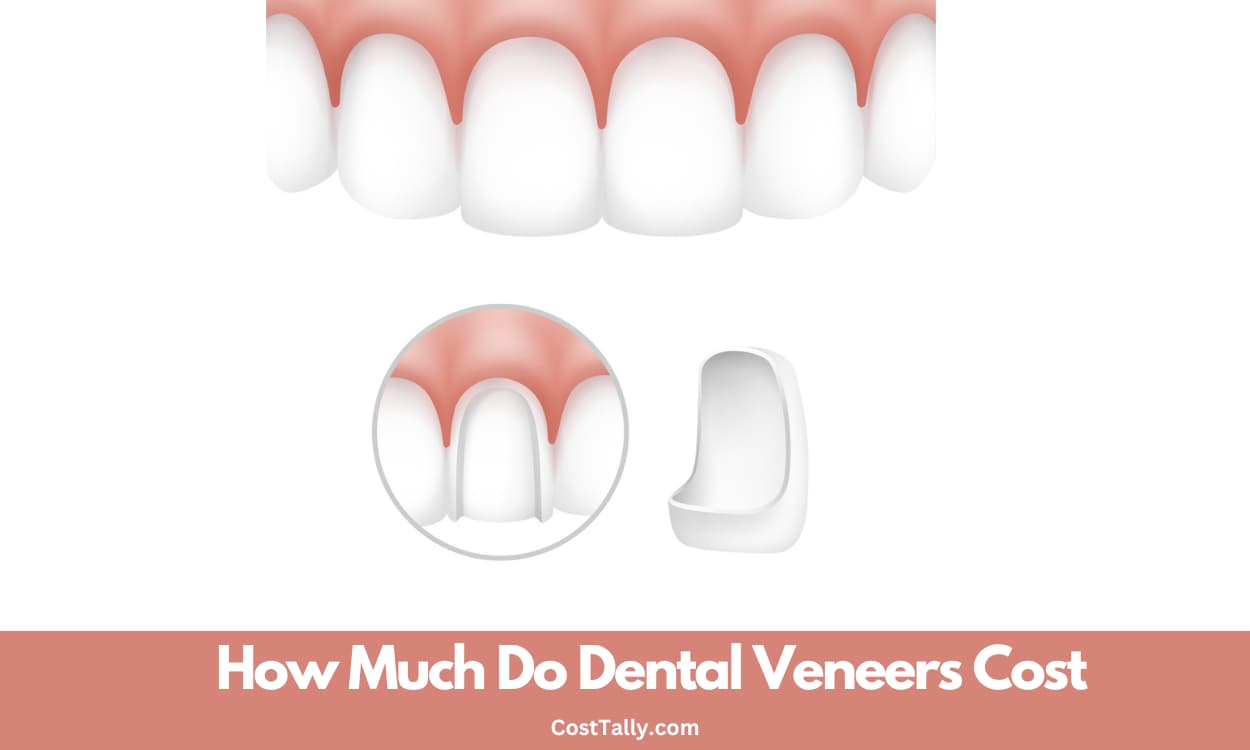Are you dreaming of a perfect smile? Dental veneers might be the answer you’re looking for. But before you jump in, it’s important to understand the costs involved.
Dental veneers are thin shells that cover the front of your teeth. They can fix many problems, like stains, chips, or gaps. But they’re not cheap, and the price can vary a lot.
The cost of veneers depends on many things. What they’re made of matters – porcelain veneers cost more than composite ones.
Where you live can change the price too. Big cities often charge more than small towns. The skill of your dentist also plays a role. More experienced dentists might charge higher fees.
How many teeth you want to cover affects the total cost. Some people get veneers on just a few teeth, while others want a full set. Each tooth adds to the bill.
How Much Do Dental Veneers Cost?

In this guide, we’ll break down all the costs of getting dental veneers. We’ll look at the different types, what affects the price, and ways to pay for them.
By the end, you’ll have a clear picture of what to expect when investing in your smile.
What Are Dental Veneers?
Dental veneers are thin covers that stick to the front of your teeth. Think of them like fake nails for your teeth. They’re made to look like your natural teeth, but better.
Why Do People Get Veneers?
People choose veneers for many reasons:
- To make teeth look whiter
- To fix chipped or broken teeth
- To make crooked teeth look straight
- To close gaps between teeth
- To make small teeth look bigger
Types of Dental Veneers
There are two main types of veneers:
- Porcelain Veneers
- Composite Resin Veneers
Let’s look at each type in more detail.
Porcelain Veneers
Porcelain veneers are made in a lab and then stuck to your teeth.
Pros:
- Look very natural
- Last a long time (10-15 years)
- Don’t stain easily
Cons:
- More expensive
- Take longer to make
- Can’t be fixed if they chip (must be replaced)
Composite Resin Veneers
Composite resin veneers are made right on your teeth by the dentist.
Pros:
- Cheaper than porcelain
- This can be done in one visit
- This can be fixed if the chip
Cons:
- Don’t last as long (5-7 years)
- Can stain over time
- May not look as natural as porcelain
Comparing Porcelain and Composite Resin Veneers
| Feature | Porcelain Veneers | Composite Resin Veneers |
|---|---|---|
| Cost | Higher | Lower |
| Durability | 10-15 years | 5-7 years |
| Appearance | Very natural | Good, but may not look as natural |
| Stain Resistance | Excellent | Good, but can stain over time |
| Repair | Must be replaced if damaged | Can often be repaired |
| Number of Visits | Usually 2-3 | Usually 1 |
How Much Do Dental Veneers Cost?
The cost of veneers can vary a lot. It depends on things like:
- What they’re made of (porcelain or composite)
- Where you live
- How good your dentist is
- How many teeth need veneers
- How hard your case is
Here’s a rough idea of what veneers might cost:
- Porcelain veneers: $925 to $2,500 per tooth
- Composite veneers: $250 to $1,500 per tooth
Remember, these are just estimates. Your dentist can give you a more exact price.
What Else Might You Have to Pay For?
When you’re thinking about the cost of veneers, don’t forget about:
- The first check-up
- X-rays
- Teeth cleaning
- Temporary veneers (if you need them)
- Follow-up visits
Will Insurance Pay for Veneers?
Most of the time, insurance won’t pay for veneers. That’s because they’re usually seen as a beauty treatment, not a medical need.
But if you need veneers because of an accident, insurance might help pay. It’s best to check with your insurance company to be sure.
Are Veneers Worth the Money?
This is a big question. Here are some things to think about:
- Veneers can last a long time if you take care of them
- They can make you feel better about your smile
- They might be cheaper in the long run than other ways to fix your teeth
- They can help protect weak teeth
But remember, veneers are not for everyone. Talk to your dentist about whether they’re right for you.
What Happens When You Get Veneers?
Getting veneers usually involves these steps:
- First Visit: Your dentist checks your teeth and talks about what you want.
- Getting Ready: The dentist shapes your teeth to make room for the veneers.
- Making the Veneers: For porcelain veneers, the dentist sends a mold of your teeth to a lab. For composite veneers, the dentist makes them right there.
- Putting Them On: The dentist sticks the veneers to your teeth with special cement.
- Follow-Up: You come back to make sure everything is okay.
Other Ways to Improve Your Smile
If you’re not sure about veneers, there are other options:
- Teeth Whitening: This can make your teeth look brighter.
- Braces: These can straighten crooked teeth.
- Bonding: This is like veneers, but uses a tooth-colored material to fix small problems.
These might be cheaper than veneers, but they might not work as well for some problems.
How to Choose a Good Dentist for Veneers?
When you’re looking for a dentist to do your veneers:
- Ask to see before and after pictures of their work
- Check if they have special training in cosmetic dentistry
- Ask how many veneers they’ve done
- Make sure you feel comfortable with them
Taking Care of Your Veneers
To make your veneers last:
- Brush and floss every day
- Don’t bite hard things like ice or nuts
- Wear a mouthguard if you grind your teeth at night
- See your dentist regularly
Good Things About Veneers
- They can fix many tooth problems at once
- They look natural
- They’re strong and can last a long time
- They don’t need special care
Not-So-Good Things About Veneers
- They can be expensive
- You might need to replace them someday
- You can’t change your mind once they’re on
- They might make your teeth sensitive at first
Questions People Often Ask About Veneers
- Do veneers hurt?
No, getting veneers shouldn’t hurt. Your dentist will numb your mouth first.
- Can I still get cavities with veneers?
Yes, you can still get cavities. You need to take good care of your teeth.
- How long do veneers last?
Porcelain veneers can last 10-15 years. Composite veneers last 5-7 years.
- Can I eat normally with veneers?
Yes, but avoid biting very hard things.
- Will veneers make my teeth look fake?
Good veneers should look natural. Talk to your dentist about what you want.
Also Check:
Wrapping Up:
Dental veneers can be a great way to improve your smile. They can fix many problems and last a long time.
But they’re also a big decision. They cost a lot and you can’t undo them.
Before you decide, think about:
- What you want your smile to look like
- How much you can spend
- What your dentist says is best for your teeth
Remember, a good smile is about more than just how your teeth look. It’s about feeling good about yourself.
Whether you choose veneers or not, take good care of your teeth and smile with confidence!



